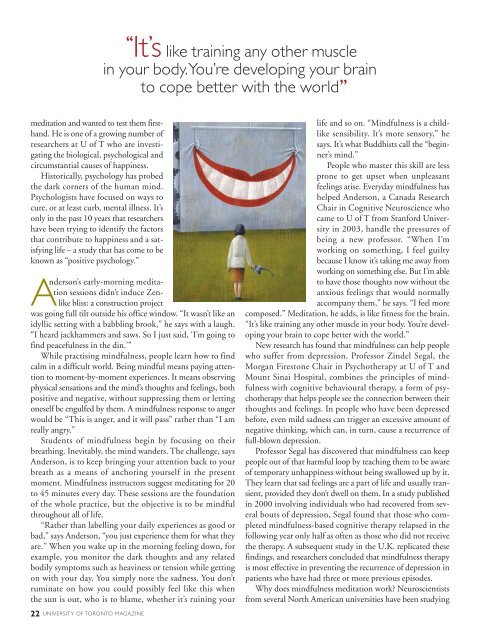20-26 3/2/05 4:53 AM Page 22‘‘It ’ s like training any other musclein your body.You’re developing your brainto cope better with the world’’meditation and wanted to test them firsthand.He is one <strong>of</strong> a growing number <strong>of</strong>researchers at U <strong>of</strong> T who are investigatingthe biological, psychological andcircumstantial causes <strong>of</strong> happiness.Historically, psychology has probedthe dark corners <strong>of</strong> the human mind.Psychologists have focused on ways tocure, or at least curb, mental illness. It’sonly in the past 10 years that researchershave been trying to identify the factorsthat contribute to happiness and a satisfyinglife – a study that has come to beknown as “positive psychology.”Anderson’s early-morning meditationsessions didn’t induce Zenlikebliss: a construction projectwas going full tilt outside his <strong>of</strong>fice window. “It wasn’t like anidyllic setting with a babbling brook,” he says with a laugh.“I heard jackhammers and saws. So I just said, ‘I’m going t<strong>of</strong>ind peacefulness in the din.’”While practising mindfulness, people learn how to findcalm in a difficult world. Being mindful means paying attentionto moment-by-moment experiences. It means observingphysical sensations and the mind’s thoughts and feelings, bothpositive and negative, without suppressing them or lettingoneself be engulfed by them. A mindfulness response to angerwould be “This is anger, and it will pass” rather than “I amreally angry.”Students <strong>of</strong> mindfulness begin by focusing on theirbreathing. Inevitably, the mind wanders. The challenge, saysAnderson, is to keep bringing your attention back to yourbreath as a means <strong>of</strong> anchoring yourself in the presentmoment. Mindfulness instructors suggest meditating for 20to 45 minutes every day. These sessions are the foundation<strong>of</strong> the whole practice, but the objective is to be mindfulthroughout all <strong>of</strong> life.“Rather than labelling your daily experiences as good orbad,” says Anderson, “you just experience them for what theyare.” When you wake up in the morning feeling down, forexample, you monitor the dark thoughts and any relatedbodily symptoms such as heaviness or tension while gettingon with your day. You simply note the sadness. You don’truminate on how you could possibly feel like this whenthe sun is out, who is to blame, whether it’s ruining yourlife and so on. “Mindfulness is a childlikesensibility. It’s more sensory,” hesays. It’s what Buddhists call the “beginner’smind.”People who master this skill are lessprone to get upset when unpleasantfeelings arise. Everyday mindfulness hashelped Anderson, a Canada ResearchChair in Cognitive Neuroscience whocame to U <strong>of</strong> T from Stanford <strong>University</strong>in 2003, handle the pressures <strong>of</strong>being a new pr<strong>of</strong>essor. “When I’mworking on something, I feel guiltybecause I know it’s taking me away fromworking on something else. But I’m ableto have those thoughts now without theanxious feelings that would normallyaccompany them,” he says. “I feel morecomposed.” Meditation, he adds, is like fitness for the brain.“It’s like training any other muscle in your body. You’re developingyour brain to cope better with the world.”New research has found that mindfulness can help peoplewho suffer from depression. Pr<strong>of</strong>essor Zindel Segal, theMorgan Firestone Chair in Psychotherapy at U <strong>of</strong> T andMount Sinai Hospital, combines the principles <strong>of</strong> mindfulnesswith cognitive behavioural therapy, a form <strong>of</strong> psychotherapythat helps people see the connection between theirthoughts and feelings. In people who have been depressedbefore, even mild sadness can trigger an excessive amount <strong>of</strong>negative thinking, which can, in turn, cause a recurrence <strong>of</strong>full-blown depression.Pr<strong>of</strong>essor Segal has discovered that mindfulness can keeppeople out <strong>of</strong> that harmful loop by teaching them to be aware<strong>of</strong> temporary unhappiness without being swallowed up by it.They learn that sad feelings are a part <strong>of</strong> life and usually transient,provided they don’t dwell on them. In a study publishedin 2000 involving individuals who had recovered from severalbouts <strong>of</strong> depression, Segal found that those who completedmindfulness-based cognitive therapy relapsed in thefollowing year only half as <strong>of</strong>ten as those who did not receivethe therapy. A subsequent study in the U.K. replicated thesefindings, and researchers concluded that mindfulness therapyis most effective in preventing the recurrence <strong>of</strong> depression inpatients who have had three or more previous episodes.Why does mindfulness meditation work? Neuroscientistsfrom several North American universities have been studying22 UNIVERSITY OF TORONTO MAGAZINE
20-26 3/2/05 4:54 AM Page 23Buddhist monks – the acknowledgedworld champions <strong>of</strong> meditation – to seehow their brains differ from the averageperson’s. Segal and other researchers atU <strong>of</strong> T, meanwhile, are using advancedmedical imaging to examine how mindfulnessand psychotherapy affect thebrains <strong>of</strong> ordinary people strugglingwith depression.Along with Dr. Helen Mayberg, whois now at Emory <strong>University</strong> in Atlanta,but is still an adjunct pr<strong>of</strong>essor <strong>of</strong> psychiatryat U <strong>of</strong> T, Segal led a groundbreakingstudy in 2002 that comparedthe brains <strong>of</strong> people who had recoveredfrom depression using cognitive behaviouraltherapy with those who had useda popular antidepressant. The patientswho got well with the drug showedchanges in the lower, more primal, part<strong>of</strong> the brain known as the limbic system,while those who received therapy demonstratedchanges in the upper areas <strong>of</strong> thebrain connected with higher thought.Both areas are implicated in depression.The hopeful message from this research,says Segal, is that there are differentroutes to mental health. Drugs are notthe only solution; we can also feel betterby altering how we think.Segal, who is also head <strong>of</strong> the CognitiveBehavioural Therapy Clinic at theCentre for Addiction and Mental Health,will test this theory further later this year.He and Anderson are collaborating on aresearch project to investigate how the brains <strong>of</strong> people whohave recovered from depression respond to sad stimuli – clipsfrom movies such as Terms <strong>of</strong> Endearment, for example – beforeand after mindfulness-based cognitive therapy. Segal expectsthe mindfulness training to enable the group to watch the clipswithout becoming sad themselves. “You can change the chemicalenvironment <strong>of</strong> your brain with drugs,” says Segal, “andyou can do it with mindfulness, and by learning how to payattention in the midst <strong>of</strong> upsetting emotions.”Evidence <strong>of</strong> the healing power <strong>of</strong> mental training is excitingfor everyone interested in happiness, says Anderson, and notFeeling Good vs. Doing GoodThe meaning <strong>of</strong> happiness has changed over timeUnlike contemporary North Americans, the ancient Greeks believed happiness couldbe achieved only by being a good person; it had nothing to do with feeling good.Aristotle <strong>of</strong>fered the most complete articulation <strong>of</strong> the ancients’ views about wellbeing.He said happiness could be achieved only through virtuous conduct and rigorousthought. Pr<strong>of</strong>essor Thomas Hurka, who takes a similar view, says the good life consists<strong>of</strong> things that are valuable and worth pursuing in themselves – self-understanding,achievement and moral virtue, among others – even if they don’t always make you feelhappy in the sense <strong>of</strong> feeling pleasure.“Sometimes genuine self-understanding is painful,”says Hurka, the Henry N.R. Jackman Distinguished Pr<strong>of</strong>essor in Philosophical Studies.Early Christian scholars incorporated this notion <strong>of</strong> suffering for happiness into theirdoctrines. St.Augustine, a theologian who lived in the fourth century, argued that originalsin precluded perfect happiness in this life, but the devout would get their due in theafterlife. Reformation theorists pondered whether earthly pleasures might even be a sign<strong>of</strong> God’s grace, a reward for good behaviour in advance <strong>of</strong> the real thing in heaven.A radical break came in the 17 th century when the English philosopher John Lockesuggested that feeling good was intrinsically good because God wanted his creatures tobe happy.The right action was therefore the one that resulted in the most pleasant feelings.Utilitarianism, a philosophy that flourished in the 18 th century, extended this theoryto public life. It asserted that government should judge its policies on which ones producethe greatest happiness for the greatest number <strong>of</strong> people.The 19 th -century Englishphilosopher John Stuart Mill <strong>of</strong>fered a refined version <strong>of</strong> utilitarianism in which he distinguishedbetween “higher” and “lower” pleasures. In his view, cerebral satisfaction shouldrank higher than purely physical delight, which any animal could experience.The idea that happiness is about feeling good rather than “doing good” has moderndefenders.Wayne Sumner, a U <strong>of</strong> T philosophy pr<strong>of</strong>essor and proponent <strong>of</strong> utilitarianism,says happiness has both an immediate, emotional component (you feel fulfilled in yourlife) and a more long-term, cognitive component (you judge that your whole life is goingwell). For Sumner, this kind <strong>of</strong> happiness is the most important part <strong>of</strong> the good life. – M.E.just for those who want to prevent depression. “This empowersus as individuals to understand and regulate our own emotions,”says Anderson. “That’s part <strong>of</strong> what’s exciting about it– we’re looking at untapped human potential.”As promising as mindfulness meditation is, our happinessis not entirely within our control. Genetics plays a part,too. In 1996, <strong>University</strong> <strong>of</strong> Minnesota researcherDavid Lykken released the results <strong>of</strong> a study in which he hadexamined the role <strong>of</strong> genes in determining one’s satisfactionwith life. Lykken collected data on about 4,000 sets <strong>of</strong> twinsSPRING 2005 23
















